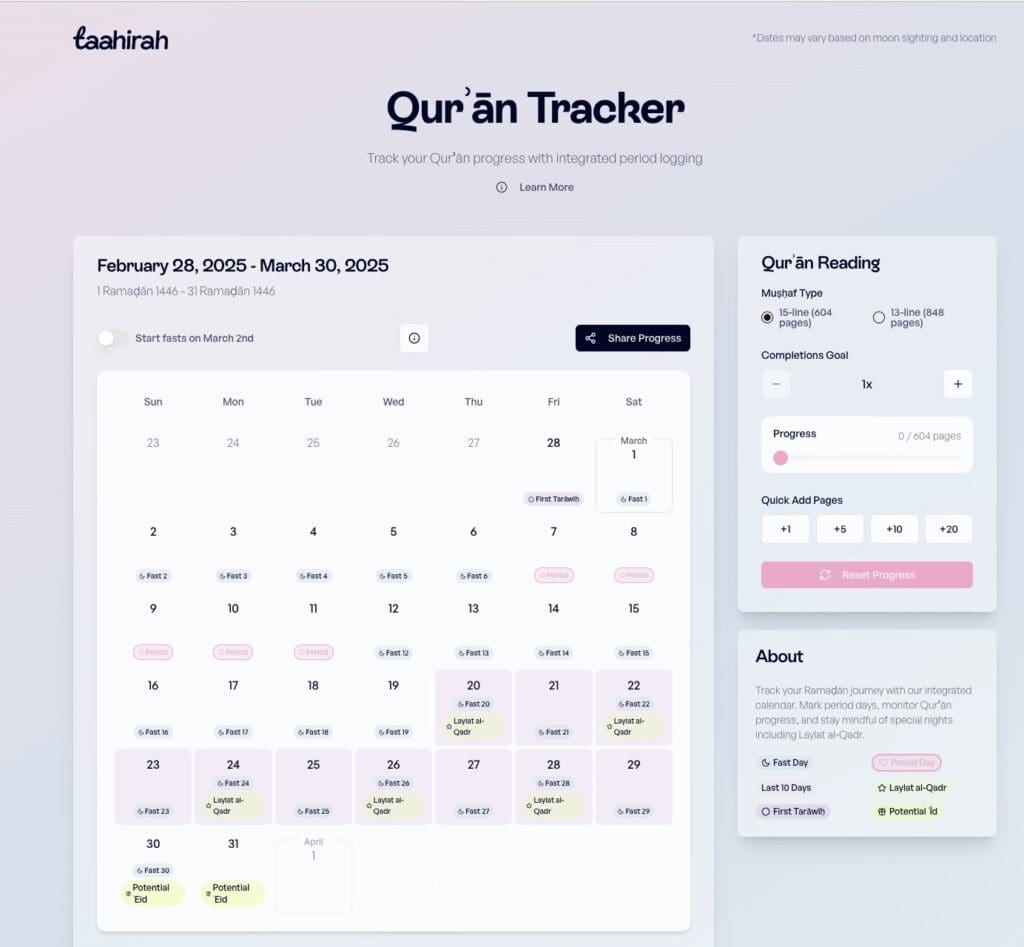
Ramaḍān: The Month of the Qur’ān
Ramaḍān is more than a month of fasting – it is the month in which Allah ﷻ sent down His final revelation, the Qur’ān, to guide humanity. It is a time of spiritual renewal, self-discipline, and deepening our connection with the Qur’ān.
While fasting is one of the most visible acts of worship in Ramaḍān, the Qur’ān holds a central place in this blessed month. As we strive to increase our recitation, many Muslim women find maintaining a structured Qur’ān reading plan challenging. One reason is the natural cycle. Some days, you may feel energised and ready to read for hours. Other days, exhaustion, pain, or your period might make it harder.
That’s why we’ve developed the Muslimah Qur’ān Tracker – a tool designed to help you stay on top of your Qur’ān reading, all while considering your menstruation:
✔ Log your menstruation dates
✔ Set a khatm goal – whether one completion or more
✔ Break it down into a daily reading plan (by page or juzʾ) to fit your schedule
✔ Easily track your progress
This tool ensures that no matter your circumstances, you can maintain a structured connection with the Qur’ān throughout the month.
Let’s explore what the Qur’ān tells us about Ramaḍān and how we can make the most of this blessed time.
A month of divine revelation
Allah introduces Ramaḍān in the Qur’ān with the following verse:
شَهْرُ رَمَضَانَ ٱلَّذِىٓ أُنزِلَ فِيهِ ٱلْقُرْءَانُ هُدًۭى لِّلنَّاسِ وَبَيِّنَـٰتٍۢ مِّنَ ٱلْهُدَىٰ وَٱلْفُرْقَانِ
“Ramaḍān is the month in which the Qur’ān was revealed—a guidance for mankind, and clear proofs of the guidance, and the criterion (between right and wrong)…” (Sūrat al-Baqarah 2:185)
Ramaḍān is distinguished as the month in which the first verses of the Qur’ān were revealed to the Prophet ﷺ by Jibrīl (ʿalayhis-salām). It marked the beginning of a divine message that would guide humanity until the end of time.
Since the Qur’ān is at the heart of Ramaḍān, this is the time to deepen our relationship with it—through recitation, study, and reflection. The Prophet ﷺ himself would review the entire Qur’ān with Jibrīl (ʿalayhis-salām) each year during this month, setting an example for us to increase our Qur’ān engagement.
ʿAbdullāh ibn ʿAbbās (raḍiy Allāhu ʿanhumā) said:
“The Messenger of Allah ﷺ was the most generous of all people; and he was the most generous during the month of Ramaḍān when Jibrīl (ʿalayhis-salām) would meet him. Jibrīl would meet him every night in Ramaḍān to study the Qur’ān with him…” (Bukhārī)
This tradition teaches us that reviewing and reciting the Qur’ān in company enhances understanding and accountability.
A path to taqwā
يَـٰٓأَيُّهَا ٱلَّذِينَ ءَامَنُوا۟ كُتِبَ عَلَيْكُمُ ٱلصِّيَامُ كَمَا كُتِبَ عَلَى ٱلَّذِينَ مِن قَبْلِكُمْ لَعَلَّكُمْ تَتَّقُونَ
“O believers! Fasting is prescribed for you—as it was for those before you—so that you may attain taqwā (God-consciousness).” (Sūrat al-Baqarah 2:183)
Fasting is not just about abstaining from food and drink. It’s also about discipline, self-restraint, and spiritual awareness. It trains us to be mindful of Allah, control our desires, and reflect on our actions.
Taqwā is also cultivated through engaging with the Qur’ān. The Prophet ﷺ said:
“The best of you are those who learn the Qur’ān and teach it.” (Bukhārī)
Alongside fasting, prioritising Qur’ān recitation and reflection is key to making the most of Ramaḍān.
The night of decree: More than a thousand months
إِنَّآ أَنزَلْنَـٰهُ فِى لَيْلَةِ ٱلْقَدْرِ ١ وَمَآ أَدْرَىٰكَ مَا لَيْلَةُ ٱلْقَدْرِ ٢ لَيْلَةُ ٱلْقَدْرِ خَيْرٌۭ مِّنْ أَلْفِ شَهْرٍۢ
“Indeed, We sent it [the Qur’ān] down during the Night of Decree. And what can make you know what is the Night of Decree? The Night of Decree is better than a thousand months…” (Sūrat al-Qadr 97:1-3)
Laylat al-Qadr, the Night of Decree, is one of the last ten nights of Ramaḍān. It marks the night when the first revelation of the Qur’ān took place. Allah describes this night as being better than a thousand months—offering unimaginable rewards for those who seek His mercy and forgiveness.
Muslims around the world dedicate these nights to prayer, dhikr, and supplication, striving to attain Allah’s pleasure. Engaging with the Qur’ān during this time is one of the most powerful ways to earn divine blessings.
Strengthening your Qur’ān engagement in Ramaḍān
Structured recitation with Taahirah’s Qur’ān tracker
A clear reading plan helps you stay consistent, especially when taking breaks for menstruation or other reasons. Whether you read by pages or juzʾ, breaking it down into manageable portions ensures steady progress.
Recite slowly
The Qur’ān is meant to be recited with care:
وَرَتِّلِ ٱلْقُرْءَانَ تَرْتِيلًۭا
“And recite the Qur’ān with measured recitation.” (Sūrat al-Muzzammil 73:4)
Instead of rushing to complete pages, embrace tartīl – a slow, deliberate recitation that allows the Qur’ān’s words to settle in your heart.
Tadabbur
The Qur’ān is not merely a book to be recited – it is a book to be lived. Allah ﷻ commands us to reflect on its verses, saying:
أَفَلَا يَتَدَبَّرُونَ ٱلْقُرْءَانَ ۚ وَلَوْ كَانَ مِنْ عِندِ غَيْرِ ٱللَّهِ لَوَجَدُوا۟ فِيهِ ٱخْتِلَٰفًۭا كَثِيرًۭا
“Do they not, then, ponder upon the Qur’ān? Had it been from someone other than Allah, they would have found in it much discrepancy.” (Sūrat al-Nisā’ 4:82)
كِتَٰبٌ أَنزَلْنَٰهُ إِلَيْكَ مُبَارَكٌۭ لِّيَدَّبَّرُوا۟ ءَايَٰتِهِۦ وَلِيَتَذَكَّرَ أُو۟لُوا۟ ٱلْأَلْبَٰبِ
“This is a blessed Book which We have revealed to you so that they may reflect upon its verses, and those of understanding may take heed.” (Sūrat Ṣād 38:29)
Tadabbur (deep reflection) is how the Qur’ān transforms hearts and minds. True engagement comes from pondering over its meanings, applying its guidance, and allowing it to shape our character and actions.
Imām al-Qurṭubī (raḥimahullāh) explains, “This verse is proof of the obligation to understand the meanings of the Qur’ān. It also proves that slow recitation is better than fast recitation, as tadabbur cannot be achieved with rushed recitation.”
Connecting emotionally
When the Prophet ﷺ recited the Qur’ān, it deeply affected him. He would cry at its warnings, rejoice at its promises, and turn to Allah in humility. Once, when he recited:
إِن تُعَذِّبْهُمْ فَإِنَّهُمْ عِبَادُكَ ۖ وَإِن تَغْفِرْ لَهُمْ فَإِنَّكَ أَنتَ ٱلْعَزِيزُ ٱلْحَكِيمُ
“If You punish them, they are Your servants, but if You forgive them, indeed You alone are the Almighty, the All-Wise.” (Sūrat al-Mā’idah 5:118)
He repeated it over and over again throughout the night, weeping as he reflected on its meaning (Ibn Mājah). This level of engagement with the Qur’ān – where its words penetrate the heart and stir deep emotions – we should strive for.
The Prophet ﷺ said:
“Indeed, this Qur’ān has descended with sadness. So when you recite it, cry. If you cannot cry, then try hard to do so.” (Ibn Mājah)
Tears reflect a soft heart that is engaged with Allah’s words.
Listening
When reading is difficult, listening can be just as impactful. Many find listening to recitation while reflecting on its meaning to be a deeply spiritual experience.
Memorisation & review
Even memorising a single āyah (verse) a day can build a deep connection with the Qur’ān. Reviewing suwar (chapters) you’ve memorised ensures you retain them while deepening your understanding.
Final reflections
Ramaḍān is more than a month of fasting – it is a time to renew our faith, cleanse our hearts, and strengthen our connection with the Qur’ān.
Start your khatm today with the Muslimah Qur’ān Tracker – your personalised way to engage with the Qur’ān while considering your cycle.
May this Ramaḍān draw us nearer to Allah, and make the Qur’ān the light of our hearts, the comfort of our souls, and the guide of our lives. May we be women of the Qur’ān – reciting it, reflecting upon it, living by it, and finding solace in its words. May it heal our hearts, uplift our spirits, and be our companion in this life and the next.

